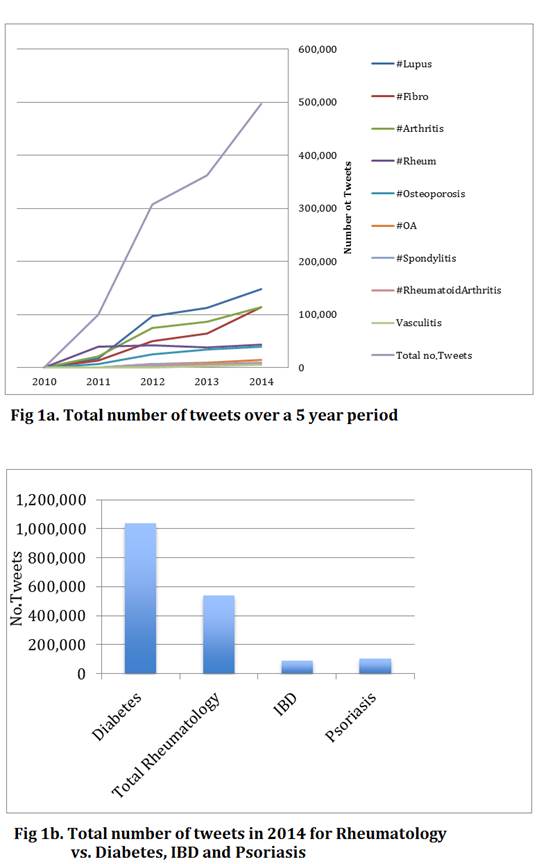Session Information
Date: Tuesday, November 10, 2015
Title: Education Poster II
Session Type: ACR Poster Session C
Session Time: 9:00AM-11:00AM
Background/Purpose:
The continued growth of social media has
allowed people to rapidly communicate, share, and develop ideas and
information. Twitter is an online social networking service which allows users
to submit and to read short 140-character messages called "tweets". Since
its creation in 2006, its user base has continued to grow with a currently estimated
number of active users of half a billion. In addition, sixty million tweets are
estimated to be generated each day.
Used
correctly, Twitter can be a valuable portal to educate patients, share research
ideas and findings and increase awareness of important health-related issues.
With regards to the subject of
Rheumatology, there is lack of knowledge in terms of its online twitter
presence and its development over the years.
The aim of this study is to highlight the
use of Twitter in relation to Rheumatology. To the best of our knowledge, no
previous research has examined this subject.
Methods:
The Symplur® healthcare analytics website
was used to retrospectively examine traffic related to chosen Rheumatology-associated
hashtags. Symplur® was used to generate statistics for the number of
impressions, unique tweets (excluding retweets) and number of participants. Some
of the hashtags that were chosen include: #Rheum, #Lupus, #Fibro, #Arthritis,
#Osteoporosis, #Spondylitis (AS), #RheumatoidArthritis, and #Vasculitis.
#Diabetes, #IBD (Inflammatory Bowel Disease), and #Psoriasis were also chosen
as comparators. Statistics were obtained from a 5 year period (2010 to 2014).
Results:
The total number of Rheumatology-related
tweets related to the major hashtags grew from only 319 tweets in 2010 to 497,595
tweets in 2014 (Fig. 1a). The #Lupus hashtag showed the most activity, followed
by #Fibro (fibromyalgia), #Arthritis and #Rheum.
Between the years 2013 and 2014, there was an average growth in
number of total tweets by 37%. When comparing #Diabetes with Rheumatology-related
hashtags in 2014, there were a total of 1,037,211 tweets related to #Diabetes vs
538,186 tweets related to Rheum hashtags (Fig. 1b).
In terms of number of contributors, in 2014, there were a total of
135,237
participants using Rheumatology-related hashtags. When
looking at influence, the top 10 contributors tweeting in the #lupus, #RheumatoidArthritis
and #Spondylitis hashtags contributed 12.6 %, 11% and 61.4% of total number of
tweets respectively.
Conclusion : Twitter
usage in relation to Rheumatology has shown a dramatic growth over the last 5
years and continues to show sustained growth. These novel findings suggest
that this social media portal has the potential to be a valuable tool in
informing and shaping Rheumatology-related healthcare.
To cite this abstract in AMA style:
Omar A, Sari I, Chan J, Haroon N, Inman RD. Twitter and Rheumatology: Significant and Incremental Growth in Usage [abstract]. Arthritis Rheumatol. 2015; 67 (suppl 10). https://acrabstracts.org/abstract/twitter-and-rheumatology-significant-and-incremental-growth-in-usage/. Accessed .« Back to 2015 ACR/ARHP Annual Meeting
ACR Meeting Abstracts - https://acrabstracts.org/abstract/twitter-and-rheumatology-significant-and-incremental-growth-in-usage/

